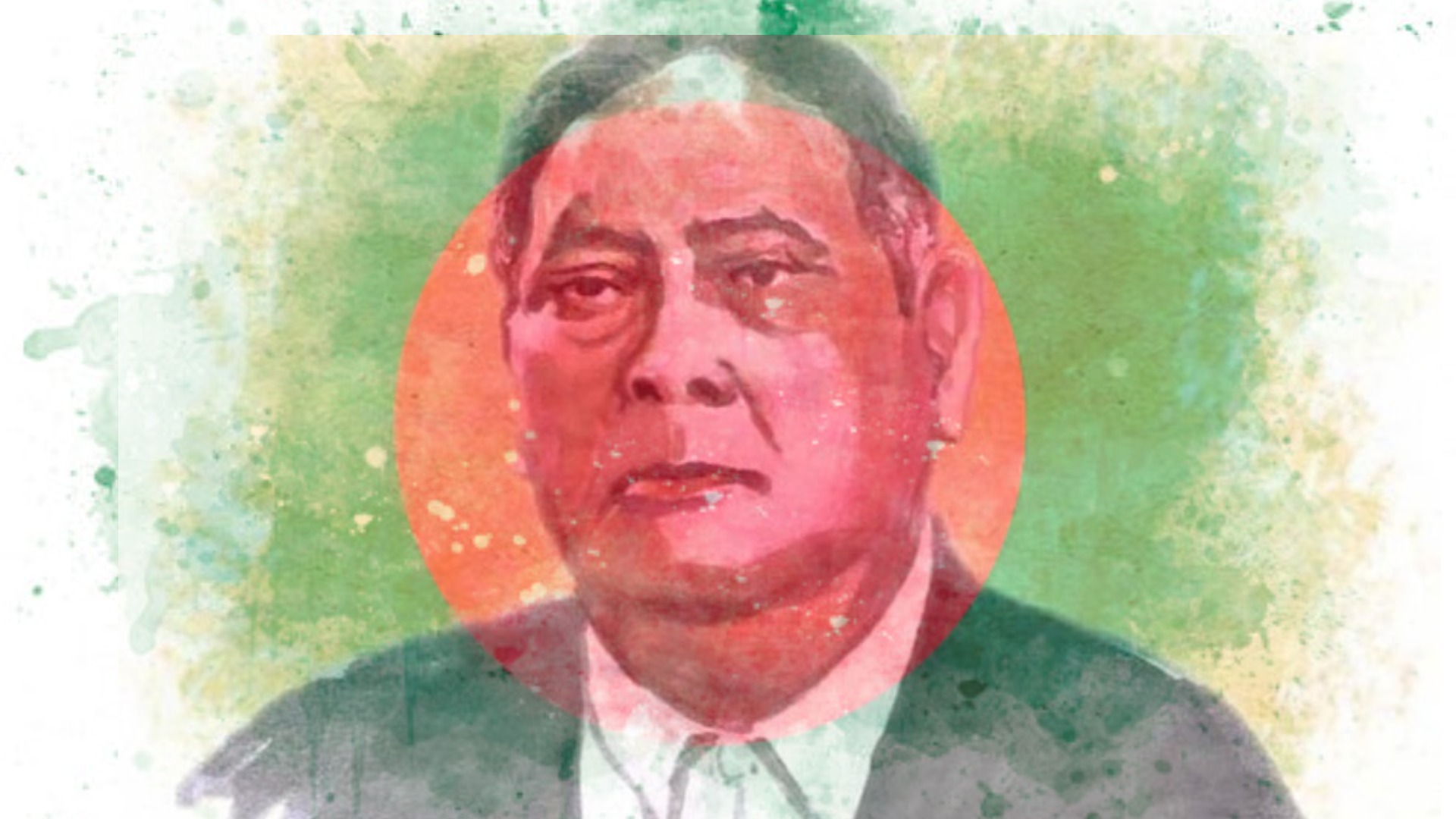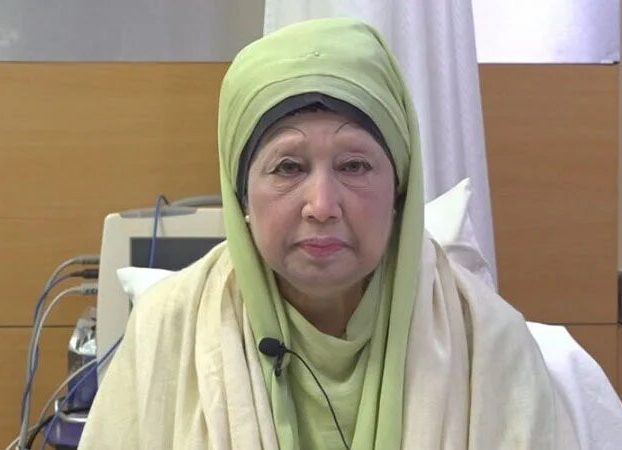
Sher-e-Bangla Abul Kasem Fazlul Hq, a towering figure in the political landscape of Bengal, was born on October 26, 1873, Born in Saturia Miyabari of Saturia Union of Rajapur Upazila of Jhalkathi District of Barisal Division of Bengal Presidency, British India. His family background was both respectable and influential, deeply rooted in the values of education, social service, and community leadership. Fazlul Huq’s father, Qazi Muhammad Wazed , was a highly respected figure in the local community, known for his profound knowledge, sharp intellect, and dedication to the law. As an accomplished educator and lawyer, Syed Ahmad Huq was not only a pillar of his family but also a guiding light in the broader society. His professional achievements and reputation as a man of integrity provided a strong foundation for his son’s upbringing.
Fazlul Huq’s mother, Saidunnesa Khatun, was a devout and strong-willed woman whose influence on her son’s life was profound. She was deeply religious and instilled in her children the importance of moral integrity, compassion, and a sense of duty towards others. Her nurturing and guidance played a crucial role in shaping Fazlul Huq’s character, particularly his sense of justice, empathy for the underprivileged, and unwavering commitment to serving society.
Growing up in such an environment, young Fazlul Huq was surrounded by the ideals of justice, education, and service to others. His early education began at the local maktab, where he was taught the Quran, along with the basics of reading, writing, and arithmetic. Even in these early years, he displayed an exceptional aptitude for learning, quickly absorbing the lessons and earning the admiration of his teachers.
Recognizing his potential, Fazlul Huq’s family made the pivotal decision to send him to Kolkata (then Calcutta), the cultural and educational epicenter of British India. This move was instrumental in broadening his intellectual horizons and exposing him to a more diverse and stimulating educational environment. In Kolkata, his formal education commenced at St. Xavier’s School, a prestigious institution known for its rigorous academic standards. At St. Xavier’s, Fazlul Huq excelled in his studies, demonstrating not only a remarkable ability to grasp complex subjects but also a deep interest in a wide range of disciplines, including history, philosophy, and literature.
Fazlul Huq’s academic journey continued at the University of Calcutta, one of the foremost centers of higher learning in the British Empire at the time. His years at the university were marked by academic excellence and a growing interest in the political and social issues of the day. In 1890, he passed the entrance examination from Calcutta Madrasa, securing the top position, which was a testament to his intellectual prowess and dedication. He went on to complete his B.A. degree in 1893 .
After passing BA, he was first admitted in MA class in English language. Just six months before the exam, a friend quipped to him that Muslim students don’t study math because they are not brilliant. Hearing this, AK Fazlul Haque became stubborn. He promised to take the exam in Mathematics. After that, he got first class in just six months of maths.
Fazlul Haque was very interested in sports. He was involved in various sports in his early life and was later known as a patron of various sports. He has been associated with Mohammedan Football Club since its inception. Besides, he liked various sports including chess and swimming
Legal Career and Entry into Politics
In 1897, Fazlul Huq completed his law degree from the University of Calcutta and began practicing law in the Barisal court. He quickly established himself as a successful lawyer, known for his dedication to justice and his commitment to serving marginalized communities. His legal acumen and sense of fairness earned him widespread respect, and he soon gained the trust and admiration of the people of Bengal.
Alongside his legal career, Fazlul Huq became increasingly drawn to politics. He began to actively participate in forming public opinion against British rule and soon emerged as a prominent political leader. In 1906, he joined the All India Muslim League, marking a significant turning point in his political career. During this time, he played a crucial role in opposing the partition of Bengal, advocating for the rights of Muslims in Bengal, and establishing himself as a leader of the masses.
*Leadership in the Calcutta Municipal Corporation and First Muslim Mayor*
In 1913, Fazlul Huq was elected Chairman of the Calcutta Municipal Corporation, marking an important milestone in his political journey. As Chairman, he played a pivotal role in the development of the city’s infrastructure, water supply, and healthcare services. Under his leadership, significant improvements were made to the sanitation and overall quality of life in Calcutta.
In 1914, Fazlul Huq became the first Muslim Mayor of the Calcutta Municipal Corporation. As Mayor, he continued his efforts to develop the city and focus on the welfare of its residents. He initiated various projects to improve sanitation, roads, and the water supply system. His dedication to the city’s development earned him the love and respect of the people of Calcutta, who saw in him a leader committed to their well-being.
Role in the All India Muslim League and Founding of the Krishak Praja Party
In 1920, Fazlul Huq was elected President of the All India Muslim League. During his leadership of the Muslim League, he played a crucial role in advocating for the rights of Muslims in Bengal. At this time, he became a vocal advocate for the rights of Bengal’s farmers and peasants. The plight of Bengal’s farmers, who were often trapped in poverty and debt, deeply affected Fazlul Huq, and he dedicated himself to addressing these issues. In 1929, he presided over the All India Peasants’ Conference, where he strongly advocated for the cancellation of farmers’ debts.
These efforts made Fazlul Huq immensely popular among the rural population of Bengal. In 1936, he was honored with the title “Sher-e-Bangla” or “The Tiger of Bengal,” symbolizing his outstanding leadership and dedication to the rights of Bengal’s farmers and common people.
In 1937, Fazlul Huq founded the Krishak Praja Party, a political party dedicated to representing the interests of farmers, peasants, and the common people of Bengal. The party’s primary focus was on land reforms, ensuring land rights for farmers, and establishing social justice. Under Fazlul Huq’s leadership, the party quickly gained widespread support among the rural population, further solidifying his status as a champion of the common people.
Tenure as Bengal’s Premier and the Lahore Resolution
In 1937, Fazlul Huq was elected as the Premier (Prime Minister) of Bengal, a position he held until 1943. As Premier, he implemented significant reforms in agriculture, education, and health in Bengal. Under his leadership, land reform laws were enacted, securing land rights for farmers and protecting them from exploitation by landlords. He also prioritized education, introducing compulsory primary education, and worked tirelessly to improve public health services.
One of the most significant contributions of Fazlul Huq’s political career was the Lahore Resolution of 1940. Through this resolution, he called for the creation of an independent state for Muslims in British India, which later became the foundation for the creation of Pakistan. The Lahore Resolution was a turning point in the political history of the Indian subcontinent, marking the beginning of the movement that ultimately led to the partition of India and the creation of Pakistan. Fazlul Huq’s political wisdom and foresight were instrumental in shaping the future of the subcontinent.
Post-Independence Role and Conflicts
After the partition of India in 1947 and the creation of Pakistan, Sher-e-Bangla Fazlul Huq became the first Education Minister of Pakistan. As Education Minister, he played a vital role in promoting education across the newly formed country, taking various initiatives to expand educational opportunities for all.
Later, he served as the Governor of East Pakistan (present-day Bangladesh), where he focused on the development of the region and the welfare of its people. As Governor, he initiated several developmental projects aimed at improving the infrastructure and quality of life in East Pakistan. However, in the later years of his political career, he became embroiled in conflicts with the Muslim League, leading to a gradual withdrawal from active politics.
Death and Legacy
Sher-e-Bangla Fazlul Huq passed away on April 27, 1962, in Dhaka. His death was mourned deeply by people across Bangladesh and Pakistan. His contributions and his political life are still remembered with great respect and admiration in Bangladesh. His legacy as a leader who dedicated his life to the welfare of the common people remains deeply embedded in the history and culture of Bangladesh.
Throughout his long political career, Sher-e-Bangla Fazlul Huq made significant contributions to the lives of Bengal’s farmers, peasants, and common people. He was a leader who embodied honesty, courage, and discipline, always working for the betterment of society. His life, work, and ideals continue to inspire future generations in Bangladesh, serving as a guiding light for those who aspire to serve the people selflessly.
Sher-e-Bangla Fazlul Huq was not just a politician; he was a great leader dedicated to the people of Bengal. His life and every chapter of his work remind us of how an honest, courageous, and devoted individual can bring about change in society. His contributions to the welfare of the common people in Bengal continue to serve as a source of inspiration for all.
The life and work of Sher-e-Bangla teach us that a true leader’s work is not just about gaining power but about working for the welfare of the people. His legacy, teachings, and ideals will forever remain an eternal source of inspiration in the history of Bangladesh.

 A.B.M. Abir
A.B.M. Abir 


















